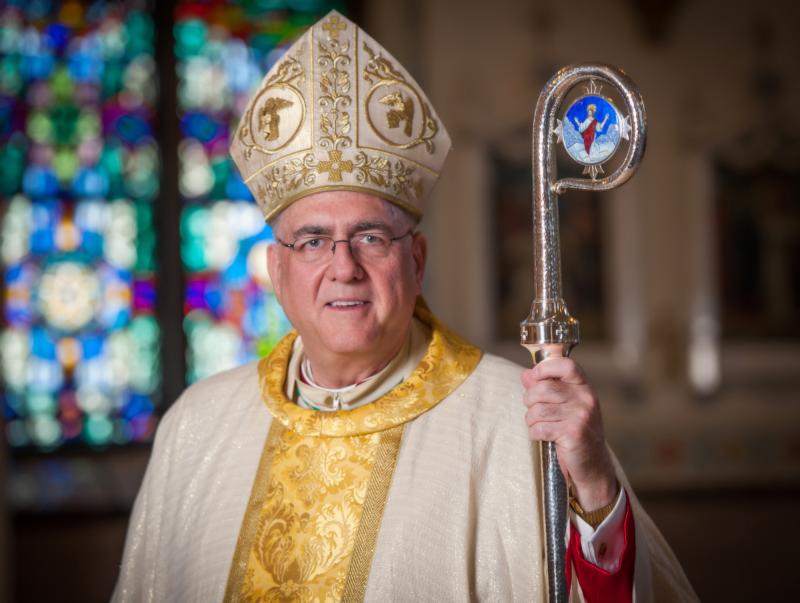
by Archbishop Joseph F. Naumann
In early February, FOCUS (Fellowship of Catholic University Students) held its SEEK conference.
Like every other major gathering this year because of the COVID virus, the conference format was quite different. Usually, SEEK is held at a major convention center with FOCUS missionaries and college students gathering from all over the country.
For SEEK21, more than 25,000 young adults gathered in living rooms, campus centers and parishes to participate through the wonders of technology in an event that always features some of the most gifted and inspirational Catholic speakers.
Many participated entirely virtually from their home or dorm room. There were, however, many others who attended at several satellite locations for hybrid experiences of SEEK, utilizing large screens to view the keynote speakers as well as benefiting from in-person presentations, eucharistic adoration, the sacrament of reconciliation and Masses at campus ministry centers or parishes.
On Thursday evening, Feb. 4, the first night of SEEK, I was at Benedictine College joining with almost 200 BC students participating in the opening night of this amazing event.
The featured in-person speaker was Dr. Edward (Ted) Sri. Benedictine College is the birthplace of FOCUS.
In 1997, the original FOCUS missionaries (recent college graduates) began their evangelizing efforts in Atchison, to help college students develop or deepen their relationship with Jesus and fall in love with his bride, the church.
The first FOCUS conference, a forerunner to what became SEEK, occurred at Lake Perry with 25 student participants.
Dr. Sri, a faculty member at BC at the time, was instrumental in bringing FOCUS to Benedictine. He now serves as the director of formation for FOCUS missionaries.
Dr. Sri gave a very inspiring and insightful presentation. At one point, he mentioned the temptation to think that we can achieve sanctity by human effort and willpower.
Dr. Sri referred to St. Thérèse of Lisieux, the Little Flower, who counseled a young novice, frustrated by her lack of progress in her pursuit of holiness, not to strive to ascend the mountain of sanctity by her own determination and willpower.
Instead, St. Thérèse advised the young nun to allow Jesus to encounter her in her own lowliness and poverty.
The day before the SEEK conference, we had a virtual gathering of the priests of the archdiocese. The purpose of our meeting was to support and encourage each other as we strive to be good shepherds for our people through this time of enormous challenges.
A couple of our priests gave both inspiring and practical presentations on keeping ourselves spiritually healthy, even during a pandemic.
One of our presenters was experienced in the 12-step methodology originally developed by Alcoholics Anonymous to help individuals break free from addiction and gain physical, emotional and spiritual health. He acknowledged how, early in his priesthood, he had attempted to win the admiration of others by his zeal, competency and skill.
In so doing, he placed enormous pressure on himself by striving for perfection by relying on his own ingenuity, determination, abilities and power.
He set himself up for persistent feelings of inadequacy and left himself vulnerable to numb himself and seek consolation from his perceived failures by turning to addictive behaviors.
From his own painful experience, he counseled us to approach God through our weakness, rather than trying to impress Our Lord with our strength.
As we begin the Lenten season, I encourage us to keep in mind this wisdom to approach God by leading with our poverty and weakness. Lent is a time to increase our prayer and ascetical practices, such as fasting from food, drink and forms of entertainment.
These practices are important and necessary for spiritual growth. We create more space for God by freeing ourselves from activities that tempt us to rely upon them for comfort and consolation, instead of opening our hearts to God.
With the entire church united in penitential practices, this is a time when we find the support to turn our hearts to God more and to material consolations less.
However, we also have to be careful not to fall into the illusion that we can develop virtue and ascend to holiness by our own power and determination. We must begin Lent with the realization that there is very little we can accomplish on our own but that, with God, all things become possible.
Lent summons us to depend on ourselves less and upon God more. We will be amazed what God can accomplish if we surrender our poverty to him.
Like the boy in the Gospel with a couple of fish and few loaves of bread, Our Lord can take the little we are able to offer and make it sufficient — not only to satisfy our own hunger but the hungers of many more.
Consider how in 1997 FOCUS reached 25 college students with its first conference and now, not even 25 years later and in the midst of a pandemic, they were able to touch the hearts of more than 25,000.
According to my math, that is a return of a thousandfold.
An important way that we approach Our Lord with our weakness is through the sacrament of penance/reconciliation. In order to make a good confession, there are two things necessary on our part: 1) faith in God’s merciful and unconditional love; and 2) the humility to acknowledge our poverty, our sins.
When we approach God through this sacrament, we are leading with our weakness and, in so doing, allowing the power of God’s mercy to enter into our hearts.
During this Lent, let us approach God with humility and permit him to infuse the power of his transforming love into our souls.

